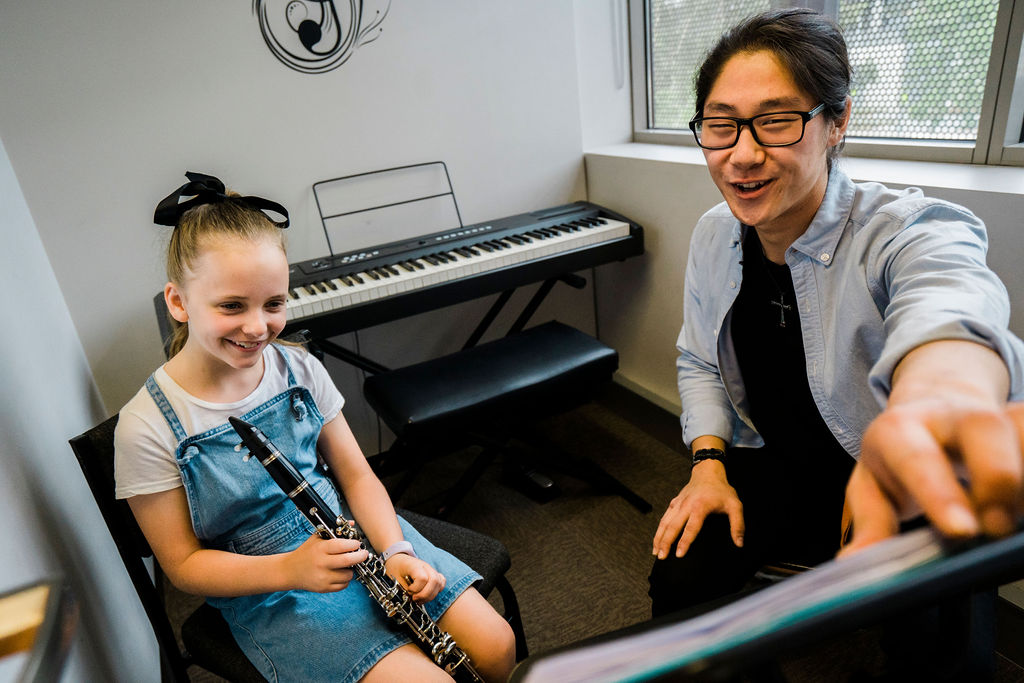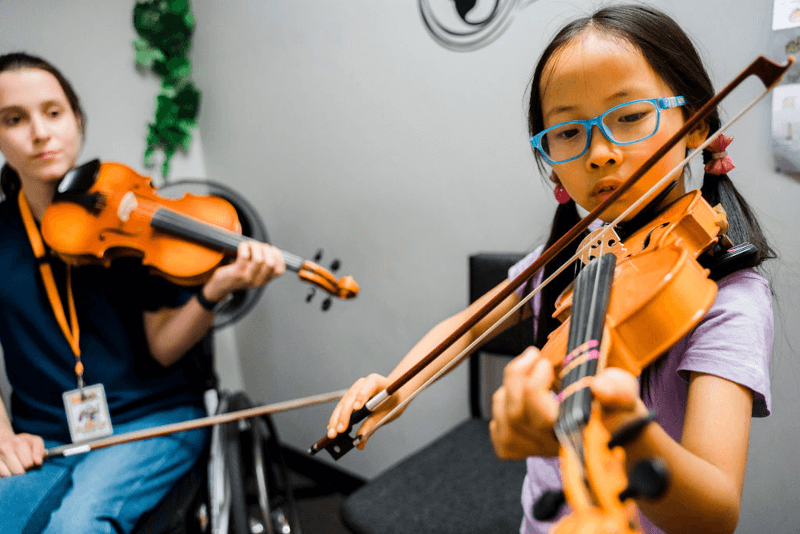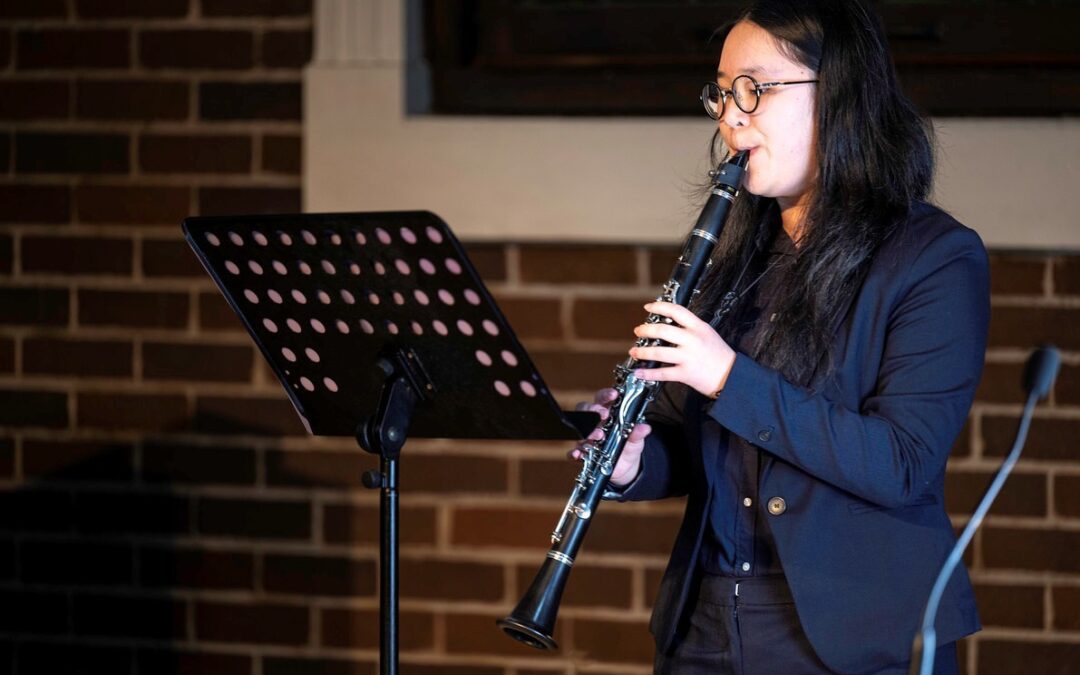In this blog we will outline the basics of the AMEB and the exams that they offer. If you are interested in undertaking AMEB exams, call us to book in with one of our highly qualified tutors!
The Australian Music Examinations Board (AMEB) formed in 1918 is a national body with the purpose of providing graded assessments recognising the achievements of music students.
They offer;
- A qualification that is widely recognised and respected
- The only examination body with formal links to major Australian universities and Ministers for Education
- The most widely-used assessment system for Music, Speech and Drama in Australia
- Assessments from preliminary to diploma level
- Highly-trained examiners who are specialists in their instrument
- Detailed written reports for practical examinations
- Fresh and accessible syllabuses developed in consultation with teachers, parents and student
Whilst undertaking examinations is not a compulsory step in a musicians progression, there are some benefits to it. This includes;
- Formalised qualifications that are widely recognised, which certain schools look upon fondly, and can assist in being hired professionally once higher grades have been achieved
- Provides structure on a macro level to your music education, setting clear goals and outlined steps to get you there
- Gives a clear indication of what needs to practiced weekly, which can be more difficult to plan than you’d think
- The sense of accomplishment and celebration when a student passes another exam is a very rewarding experience
- Overcoming the nerves associated with performing music in front of someone is an important step in any musicians journey
- Improve comfort and confidence when performance opportunities arise in the future

Different Types of Exams
The AMEB offer a number of different exam types, which ensures that undertaking examinations is a viable option for a wide variety of students. Each grade requires a new book containing the required pieces, with technical work books containing content that spans multiple grades.
Traditional Comprehensive exams are focused on classical music, which is a tried and tested way of ensuring music is learnt with a wide scope, encompassing both pieces and additional musical knowledge important for development. This is discussed further in the below section. For piano, singing and saxophone, there is a “for Leisure” option, which provides a more contemporary repertoire list whilst still containing additional technical requirements to facilitate a broad and comprehensive knowledge of their instrument.
They offer a Repertoire exam, which replaces additional technical, sight reading, aural and general knowledge requirements with an additional piece for examination for those who want to avoid technical requirements.
The AMEB also host Rockschool Exams, which is a contemporary syllabus designed for piano, guitar, bass, drums and vocal students. These exams are all self contained (pieces, scales, aural, sight reading) in one book, and come with professionally recorded backing tracks to assist examinations and practice.

The Basic Structure of the Exam
The exact contents of the exam vary from grade to grade and instrument to instrument.
A comprehensive exam requires three core pieces, technical exercises, aural work, sight reading and general knowledge, with grade 2 and above requiring an additional two pieces.
A repertoire exam covers pieces only, but in order to replace some of the theory work, a candidate must present FOUR pieces in total.
This is a large amount of content to cover, and we advise one year to complete each grade is a manageable pace, enabling a student to retain information and receive good marks.
When Will my Exam be?
The AMEB offers two exam sessions per year, roughly in May and November.
The enrolments for each exam period close at the end of February and August respectively, and enrolments are done online with a registered AMEB teacher or teaching institution. Exams are then scheduled by the AMEB within the session period and often scheduled on weekday mornings. It is worthwhile knowing in advance that you may need to be flexible with work and school to make it to your exam period as any rescheduling will incur a fee.
Can I Cancel or Reschedule my Exam?
Rescheduling your exam incurs an administration fee of 75% of your initial exam fee. Cancelling your exam forfeits your full exam fee.
These fees are imposed by AMEB. Please consider carefully when accepting to do an AMEB exam within one of their sessions.
It is possible to request certain days when you enrol e.g. Saturdays, however, this is a request, and there is no guarantee that AMEB will be able to fulfil your request.
Do I need an Accompanist?
You will need to provide an accompanist, at a cost to you, for all instruments except Piano;
Violin
Trumpet
Cello
Flute
Saxophone
Clarinet
For the following instruments you can choose to use an accompanist or a backing track;
Voice
Guitar
Drums
If you would like help in finding an accompanist, you can contact the Accompanists’ Guild of NSW
Can I use photocopies of music in the exam?
AMEB is very strict on this and DO NOT allow photocopies of music in the exam.
Loose sheet music that has been legally purchased and printed from the internet is permitted however we recommend taking these pieces in a display folder to keep the sheets together.
There can be pencil marks on your sheet music such as bowing or fingering markers, but any notes used to assist general knowledge questions are not allowed
The exam process can be quite convoluted. If you need help understanding how any of it works or if you are interested in undertaking an AMEB exam, please get in touch with us at Maxx Music. We can pair you up with one of our highly trained AMEB teachers to ensure you get the best mark. We can take away all the stress of booking process and enrol for you when we are confident you are in a position to achieve a great mark!
Call us on 9894 0000, or email lessons@maxxmusic.com.au










